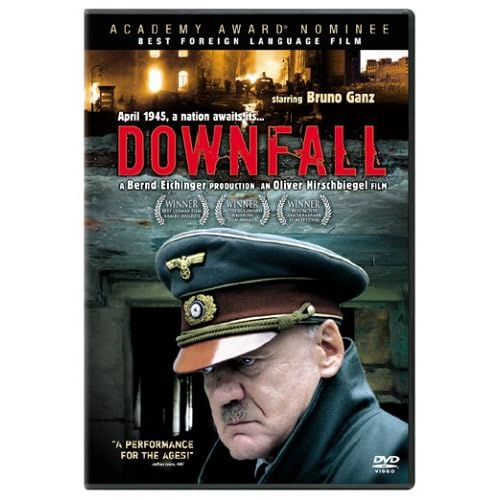
History is written by the winners. The result of that is that the experiences and stories of those who were on the losing end of the conflict is rarely told. When we think of the fall of the third reich we tend to view the event (rightfully, IMHO) with great joy. At last the evil that Hitler had tried to impose on the world had been brought to a close.
Downfall is the story of the end, as told by the German side. It is fascinating. We never think about the emotional toll, the real people and lives that were involved, but Downfall tells their story. It shows a side of Hitler we never see, and often don't like to acknowledge exists: that of a personable, likable man. We have created a bit of a comic book character out of Hitler, making him such a demon that no one would realistically follow him. Downfall shows Hitler in good moments and (many) bad.
The actor who plays Hitler is absolutely brilliant. He manages to go from charming one moment to a screaming dottering old man the next. Hitler holds fast until almost the very end that they will prevail. Once he realizes that the war is lost, he makes plans to commit suicide, getting advice on how to do it most effectively. One of the interesting points of the film is how, after all is lost and the decision has been made, Hitler is still pouring over maps talking about the need to reclaim the German oilfields once the Berlin conflict has been won.
Other characters have equally depressing ends, including the Goebbels who murder their children in the bunker because they can't bear the kids to be raised in a non-Nazi Germany. Evil doesn't stop with your own family, it permeates everything.
I thought Downfall was brilliant, if wholly depressing. I've never really given thought to the real people involved on the Nazi side of the conflict. Their hopes and dreams died in that bunker. The movie is bookended by an interview with the real Traudl Junge in which she talks about the guilt she feels for having liked the most evil man who ever lived. She confesses that when she heard the war trials she was convinced that she wasn't part of it all, but later she realized that she should have listened to her conscience.
This movie is almost impossible to find in a blockbuster or other video store, but it is worth seeing. I received this as a birthday gift from my brother in law and his wife, and had asked for it because I had no other way to find it. If you have a delivery service like Netflix, this is worth putting on your list. It will give you new insight into the end of the war.
Joel
PS - I realize it seems like I recommend almost every movie I see, but that's because I don't bother to writeup the unremarkable ones...

1 comment:
When I lived in Germany for a while, the Oma (grandmother) in my homestay used to reminisce about how good things were in the 30s when the economy was booming and infrastructure was being improved by the nazis, etc. She was close to 80 at the time (1992), which means she was in her mid-20s starting a family at the time. When I challenged her a little bit, she took me down to the basement. I didn't know it, but their very impressive family house had been bombed by the allies to complete rubble, except for the basement bomb shelter. The house had been completely and seamlessly rebuilt. You could only tell by looking closely at the basement foundation that there were really two different buildings.
So for a 25-year-old new parent with a young family, I can see how the war would have been terrible, and pyschologically even 50 years later she wanted to believe that the difficulties she endured had been worth something.
Post a Comment